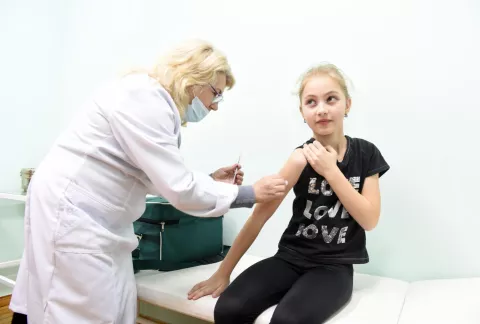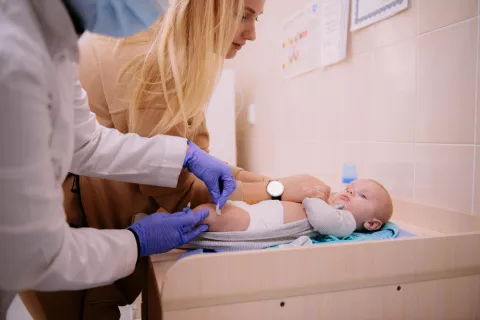European Immunization Week 2024
In Bulgaria, more than half of the parents of children 0-4 support mandatory routine immunization, according to a survey by the Ministry of Health and UNICEF

- Available in:
- Български
- English
Copenhagen, Geneva, Brussels, Sofia 23 April 2024 – Vaccines are one of humanity’s greatest achievements. In the last 50 years alone, they’ve saved 154 million lives – that’s more than 3 million lives a year or six people every minute for five decades. In the same period, vaccination has reduced infant deaths by 40 per cent; more children now live to see their first birthday and beyond than at any other time in human history.
The establishment of the Expanded Programme on Immunization (EPI) 50 years ago was a pivotal moment in the history of public health and has saved millions of lives globally every year. In 1974, only 5% of the world’s children had been vaccinated against diphtheria, tetanus and pertussis. Today, that figure has increased to nearly 85% of children worldwide and 94% in the WHO European Region.
Just five years after the introduction of the EPI, Smallpox was eradicated. Since then, the geographic range of wild poliovirus has been reduced to just two countries, and the threat of several serious infectious childhood diseases has decreased dramatically. Continued innovation in the field of immunology has led to development of vaccines that can protect against even more diseases, opening the possibility in the European Region to eliminate hepatitis B and cervical cancer in the near future.
While we celebrate these monumental achievements, which have protected the health of multiple generations, we remain in the wake of the COVID-19 pandemic and its unprecedented impact on our societies and economies, on health systems and health care delivery.
The decline in vaccination rates in some countries within the European Region between 2020 and 2022 sheds light on the vulnerability of our success. Over the past three years, more than 1.8 million children in the WHO European Region have missed their measles vaccination. The consequence of which is a 60-fold increase in the number of measles cases in 2023 from 2022, including some ofBulgaria’s neighboring countries which makes the country vulnerable to spill-over effects of migration, for instance. Additionally, Bulgaria has seen over the past days nearly two hundred confirmed cases of pertussis, with epidemiological projections of numbers going up to a thousand in the next month.
In those circumstances, UNICEF Bulgaria highlights a number of key activities and recommendations:
- UNICEF piloted a model of patronage care - Visiting nurses in Sliven and Shumen districts in the past 10 years which have proven to be highly successful for the best start in life. The scale up of universal home visiting services throughout the country will enable this to be used as a platform to raise awareness among pregnant women and parents of young children about the importance of immunizing their children as well as providing more comprehensive care;
- UNICEF supports the mobile app for parents, Bebbo. It needs to be accessible to as many families as possible in the country because it also contains valuable information on child immunization as well as on providing holistic care for every aspect of young children’s development and wellbeing;
- UNICEF supports the MoH's information campaign through the +Men website. More media and professional organizations need to get involved in the efforts to raise health literacy and combat vaccine misinformation;
- UNICEF and the MoH are exploring parents' and GPs' attitudes towards the National immunization calendar. Efforts need to be stepped up for the capacity building on interpersonal communication and building trust in vaccines by the medical students or young people preparing for parenthood.
The Ministry of Health and the United Nations Children's Fund (UNICEF) conducted a joint nationally representative survey on the attitudes of parents and general practitioners towards the National Immunization Calendar in 2023. The survey was conducted by Global Metrics, a sociological agency among 1002 parents of children under 4 years of age and 350 GPs with children in their practice. The results show that 61% of parents are in favor of mandatory vaccines and would give all or even additional vaccines to their children. Over 77% of parents identified doctors as the main source of information on vaccine issues and 95% of general practitioners (GPs) advised parents to vaccinate their children with all vaccines on the mandatory immunization calendar.
“Yet, there are pockets of inequality among vulnerable communities which deserve special attention – like Roma children, children with disabilities, refugee children, and children left behind who are often among the zero-dose or under-vaccinated children who need catch up actions to prevent further epidemiological outbursts”, highlighted Christina de Bruin, UNICEF Representative in Bulgaria.
Nearly half of GPs said they had experienced difficulties communicating with parents. One of the main reasons, according to them, is "lack of awareness" against which diseases the vaccines of the immunization calendar are and when they are administered, as well as fears and concerns about side effects of vaccines, parental disinterest regarding immunization of children, spread of negative views, misinformation and misconceptions about vaccines, problems with understanding and communication with people with low levels of education, incl. members of ethnic minorities.
„There is a necessity for trained community health workers, such as patronage nurses and health mediators to inform and support every family on how make use of their right to health care in order to allow every child to thrive, as well as the request for verified, available information accessible to every family and adapted to their needs”, added Christina de Bruin, expressing the readiness of UNICEF Bulgaria to continue working with health state authorities, families, media and professionals to ensure Bulgarian children are safe and protected.
Media contacts
About UNICEF:
UNICEF works in 190 countries and territories to save children’s lives. To defend their rights. To help them fulfill their potential. And we never give up. UNICEF, for every child.





